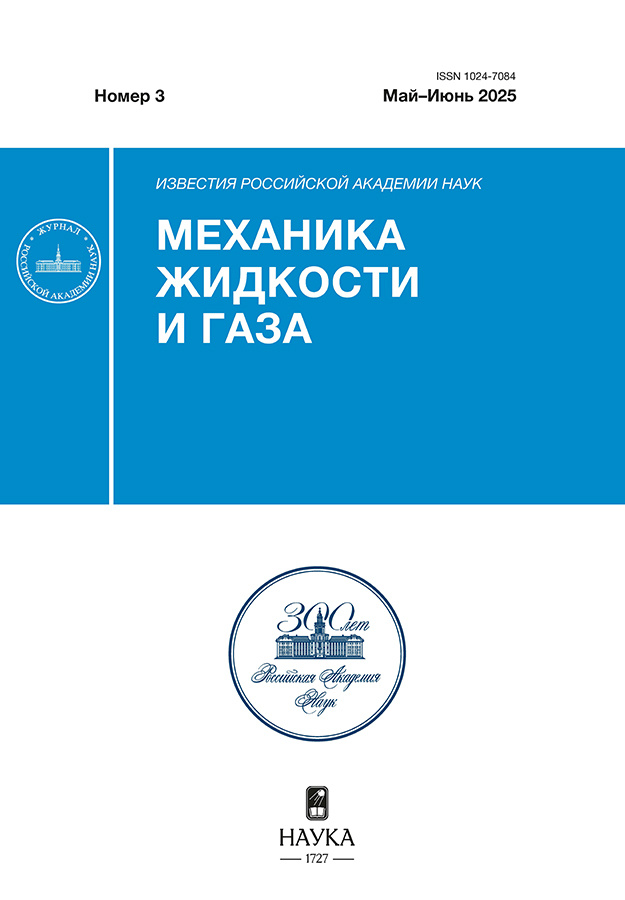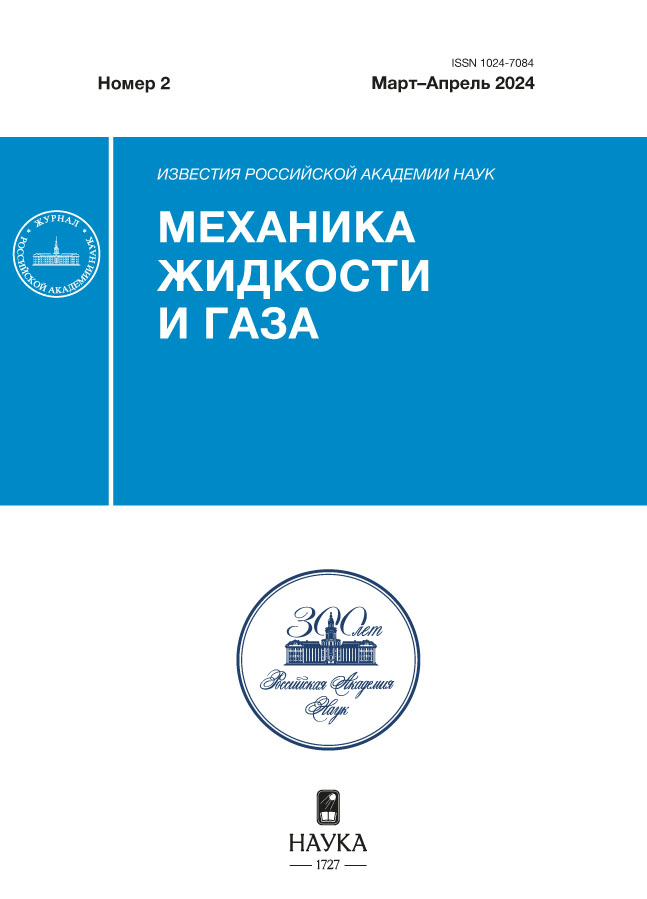Влияние отсоса газа на неустойчивость поперечного течения при обтекании стреловидного крыла
- Авторы: Новиков А.В.1,2, Образ А.О.1,2, Тимохин Д.А.2
-
Учреждения:
- Центральный аэрогидродинамический институт им. проф. Н. Е. Жуковского
- Московский физико-технический институт (национальный исследовательский университет)
- Выпуск: № 2 (2024)
- Страницы: 105-112
- Раздел: Статьи
- URL: https://kazanmedjournal.ru/1024-7084/article/view/672096
- DOI: https://doi.org/10.31857/S1024708424020096
- EDN: https://elibrary.ru/riwaap
- ID: 672096
Цитировать
Полный текст
Аннотация
Представлены результаты исследования устойчивости пограничного слоя над стреловидным крылом с участком отсоса газа через стенку по нормали к поверхности при числе Маха 2. Для рассмотренного режима течения доминирующим типом неустойчивости в пограничном слое является неустойчивость поперечного течения. Влияние отсоса газа на развитие неустойчивых мод в пограничном слое проводится с помощью линейной теории устойчивости и метода прямого численного моделирования. Численное моделирование ламинарных (невозмущенных) полей течения с участками отсоса газа и полей течения с возмущениями производится с помощью интегрирования уравнений Навье–Стокса. В рамках линейной теории устойчивости производится анализ с помощью eN-метода. Положение области отсоса варьируется с сохранением интегральной интенсивности. Показана возможность существенного подавления роста неустойчивых мод за счет оптимального расположения области отсоса.
Полный текст
Об авторах
А. В. Новиков
Центральный аэрогидродинамический институт им. проф. Н. Е. Жуковского; Московский физико-технический институт (национальный исследовательский университет)
Email: obraz.ao@mipt.ru
Россия, Жуковский; Долгопрудный
А. О. Образ
Центральный аэрогидродинамический институт им. проф. Н. Е. Жуковского; Московский физико-технический институт (национальный исследовательский университет)
Email: obraz.ao@mipt.ru
Россия, Жуковский; Долгопрудный
Д. А. Тимохин
Московский физико-технический институт (национальный исследовательский университет)
Автор, ответственный за переписку.
Email: obraz.ao@mipt.ru
Россия, Долгопрудный
Список литературы
- Устинов М.В. Управление ламинарно-турбулентным переходом на стреловидном крыле с помощью микрорельефа поверхности // Изв. РАН МЖГ. 2018. № 6. С. 43–54.
- Joslin R.D. Overview of Laminar Flow Control // NASA Tech. Pap. NASA/TP-1998-208705, 1998.
- Balakumar P., Hall P. Optimum Suction Distribution for Transition Control // Theor. Comput. Fluid Dyn. 1999. V. 13. P. 1–19. https://doi.org/10.1007/s001620050109
- Reynolds G.A., Saric W.S. Experiments on the Stability of the Flat-Plate Boundary Layer with Suction // AIAA J. 1986. V. 24. P. 202–207. https://doi.org/10.2514/3.9246
- Smith B.A. F-16XL flights could aid in HSCT design // Aviat. Week and Space Technol. Oct. 23, 1995. P. 42–44.
- Schülein E. Experimental Investigation of Laminar Flow Control on a Supersonic Swept Wing by Suction // 4th Flow Control Conference, 23–26 June 2008, Seattle, Washington. AIAA 2008–4208. https://doi.org/10.2514/6.2008-4208
- Hein S., Schülein E., Hanifi A., Sousa J., Arnal D. Laminar Flow Control by Suction at Mach 2. // CEAS/KATnet II Conference on Key Aerodynamic Technologies, 2009.
- Balakumar P. Control of Supersonic Boundary Layers Using Steady Suction // 36th AIAA Fluid Dynamics Conference and Exhibit. 2006. Conference Paper 20060022120.
- Новиков А.В., Образ А.О., Тимохин Д.А. Влияние отсоса пограничного слоя на неустойчивость поперечного течения на сверхзвуковом скользящем крыле // Уч. зап. ЦАГИ. 2023. Т. LIV. № 2. C. 16–23.
- Егоров И.В., Новиков А.В., Фёдоров А.В. Прямое численное моделирование ламинарно-турбулентного перехода при гиперзвуковых скоростях потока на супер-ЭВМ // ЖВМиМФ. 2017. Т. 57. № 8. С. 1347–1373. https://doi.org/10.7868/S0044466917080063
- Obraz A.O., Fedorov A.V. The high-speed flow stability (HSFS) software package for stability analysis of compressible boundary layers // TsAGI Sci. J. 2017. V. 48. P. 223–242. https://doi.org/10.1615/TsAGISciJ.2017022797
- Padhye A.R., Nayfeh A.H. Nonparallel stability of three-dimensional flows // AIAA Pap. 1981. Р. 81–1281.
Дополнительные файлы











